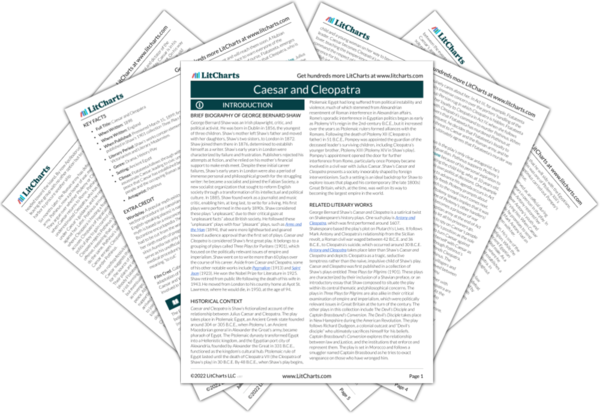Ra Quotes in Caesar and Cleopatra
Ye poor posterity, think not that ye are the first. Other fools before ye have seen the sun rise and set, and the moon change her shape and her hour. As they were so ye are; and yet not so great; for the pyramids my people built stand to this day; whilst the dustheaps on which ye slave, and which ye call empires, scatter in the wind even as ye pile your dead sons’ bodies on them to make yet more dust.
All this ye shall see; and ye shall marvel, after your ignorant manner, that men twenty centuries ago were already just such as you, and spoke and lived as ye speak and live, no worse and no better, no wiser and no sillier.
They care nothing about cowardice, these Romans: they fight to win. The pride and honor of war are nothing to them.
THEODOTUS. What is burning there is the memory of mankind.
CAESAR. A shameful memory. Let it burn.
THEODOTUS (wildly). Will you destroy the past?
CAESAR. Ay, and build the future with its ruins.

Ra Quotes in Caesar and Cleopatra
Ye poor posterity, think not that ye are the first. Other fools before ye have seen the sun rise and set, and the moon change her shape and her hour. As they were so ye are; and yet not so great; for the pyramids my people built stand to this day; whilst the dustheaps on which ye slave, and which ye call empires, scatter in the wind even as ye pile your dead sons’ bodies on them to make yet more dust.
All this ye shall see; and ye shall marvel, after your ignorant manner, that men twenty centuries ago were already just such as you, and spoke and lived as ye speak and live, no worse and no better, no wiser and no sillier.
They care nothing about cowardice, these Romans: they fight to win. The pride and honor of war are nothing to them.
THEODOTUS. What is burning there is the memory of mankind.
CAESAR. A shameful memory. Let it burn.
THEODOTUS (wildly). Will you destroy the past?
CAESAR. Ay, and build the future with its ruins.











